Henrik5000
The Vanguard Mega Cap ETF (NYSEARCA:MGV) is typical of the low-cost high-performing funds that investors have come to expect from Vanguard. The expense fee is very reasonable (0.07%) and the ETF has delivered excellent long-term total returns. In today’s uncertain market, many investors would likely find this kind of value-focused portfolio attractive for relatively less risky exposure to growth and income through some of the best and largest companies in the world. During the 2020 bear market, and over the past year, MGV has significantly outperformed the S&P 500 (see graphic below). Meantime, the top-10 holdings are a desirable mix of healthcare, financials, and energy stocks. In addition, the fund throws quarterly distributions with a current SEC 30-day yield of 2.5%. MGV is a BUY.
Investment Thesis
The MGV ETF offers investors low-cost and diversified exposure to the largest value stocks in the U.S. market. However, many of these “value” companies also have very attractive long-term track records of delivering growth and income as well. That being the case, investors should consider the MGV ETF as a core holding within a well-diversified portfolio built for the long-term and to weather challenging markets.
Let’s take a closer look at the MGV portfolio to see how it has positioned investors for success going forward.
Top-10 Holdings
The top-10 holdings in the MGV ETF are listed below and equate to what I consider to be a moderately well-diversified 27% allocation among the 146 stocks that compose the entire portfolio:
Vanguard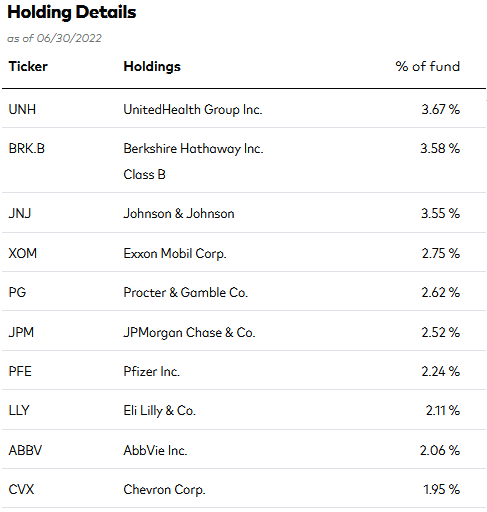
The top holding with a 3.7% weight is UnitedHealth Group (UNH). As many of you know, UNH is the highest weighted component (~11%) of the DJIA due to its relatively high stock price ($542.34). The diversified healthcare company is up 31.6% over the past year and has significantly outperformed all the major market averages. UNH has a solid long-term track record of delivering revenue and earnings growth through all market cycles.
Berkshire Hathaway (BRK.B) is the #2 holding with a 3.6% weight. Berkshire has been making headlines recently for its consistent purchases of Occidental Petroleum (OXY) stock – it now holds close to a 20% stake in the company (3.4% of Berkshire Hathaway’s total portfolio). As you know, Berkshire’s #1 stake is in Apple (AAPL), which accounts for 41.9% of the portfolio.
The #3 holdings is Exxon (XOM) and when combined with the #10 holding Chevron (CVX), give the MGV ETF an aggregate 4.7% weighting in the two largest energy companies in America. Exxon and Chevron both have strong yields – 3.6% and 3.4%, respectively, and based on Friday’s stellar Q2 earnings reports, the outlook for dividend growth is excellent. Both energy giants have significantly outperformed the broad market averages this year (not even counting their strong dividends):
Pharmaceutical companies are well represented in the MGV portfolio with #7 holding Pfizer (PFE), #8 holding Eli Lilly (LLY), and #9 holding AbbVie (ABBV), which – in aggregate – account for 6.4% of the portfolio. Drug companies are typically defensive plays and offer somewhat of a shelter from the storm during bear markets. Indeed, each has outperformed the market over the past year and are up 18%, 34%, and 21%, respectively.
The MGV portfolio’s overall sector allocation is shown below:
Vanguard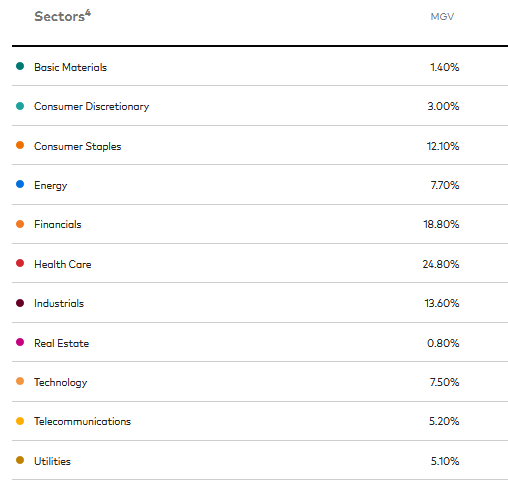
My only observation with the allocation shown above is that given what I consider to be a still quite undervalued Energy sector, I am surprised MGV’s weighting of the Energy sector is relatively on par with Technology. I would have assumed a relatively higher position in Energy – which also would add more income for shareholders.
Performance
As mentioned earlier, the MGV ETF has a strong long-term performance track record – delivering a 10-year average annual return of 12.2%:
The following graphic compares the price return of the MGV ETF over the past five years with several competing funds, including the iShares S&P 500 Value ETF (IVE), the Vanguard Value ETF (VTV), and the Vanguard Mega Cap ETF (MGC), as well as the broad market averages as represented by the (SPY), (DIA), and (QQQ) ETFs, respectively:
As can be seen, the MGV ETF has outperformed the other two value-oriented funds but has generally lagged the overall mega-cap space and broad market averages over the past 5-years.
However, YTD during the 2020 bear market, MGV – although still down – has been the winner of the group:
Risks
While a value-oriented ETF like MGV has a generally lower risk profile as compared to the typical mega-cap or broad market average fund, it is still exposed to the associated overall risk of the markets and global economy. That being the case, high-inflation, expectations of a generally rising interest rate environment, and the risks associated with Putin’s horrific war-of-choice in Ukraine (that broke the global energy & food supply chains) all pose a risk to MGV shareholders going forward.
In addition, many of these mega-cap companies have global operations and can be negatively impacted by foreign-exchange exposure as a result of the strong US dollar.
Summary & Conclusion
Vanguard’s MGV ETF is a low-cost way for investors to gain nicely diversified exposure to some of the best mega-cap value companies on the planet. MGV has a solid long-term performance track record and, in my opinion, the portfolio is ideally positioned for success going forward. That being the case, investors interested in constructing a well-diversified portfolio built for the long-term, should consider allocating some capital to the MGV ETF.
MGV is a BUY.
I’ll end with a 10-year comparison of MGV with the broad market averages:
Obviously the MGV ETF, being a value-oriented fund, lagged the broad market averages during the bull market. However, for those investors who believe the days of over-easy money and super low interest rates are over, the MGV ETF may be just what they are looking for.


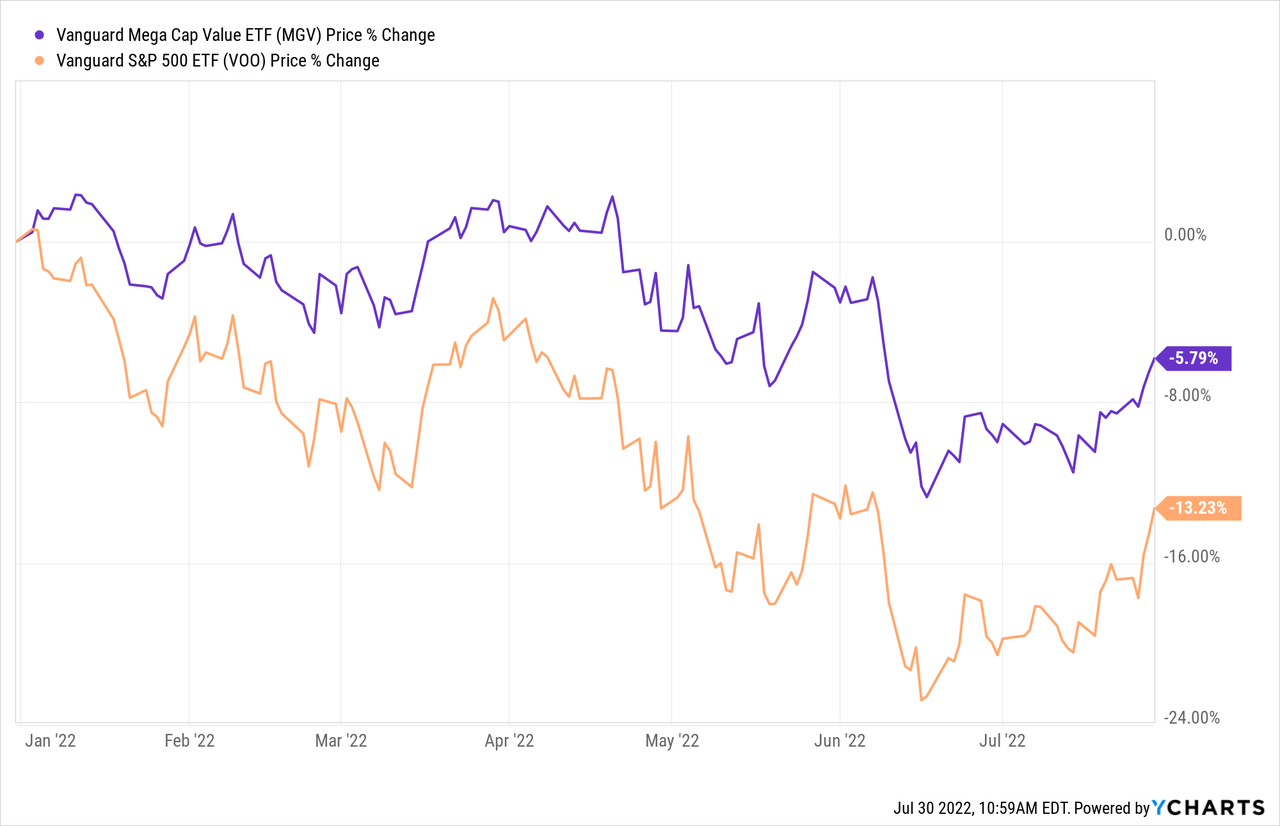
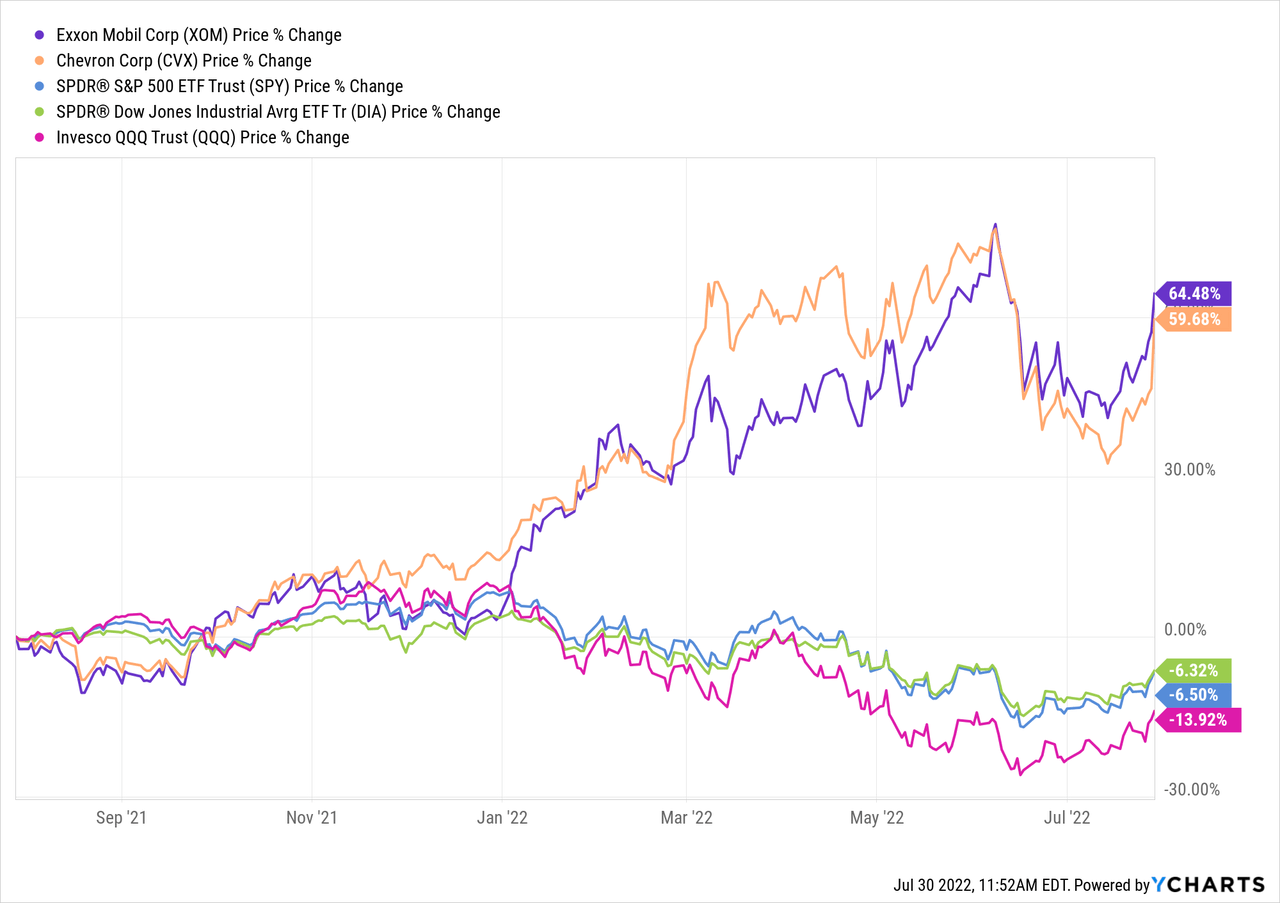
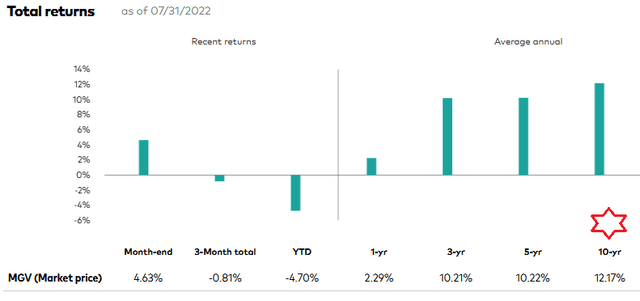
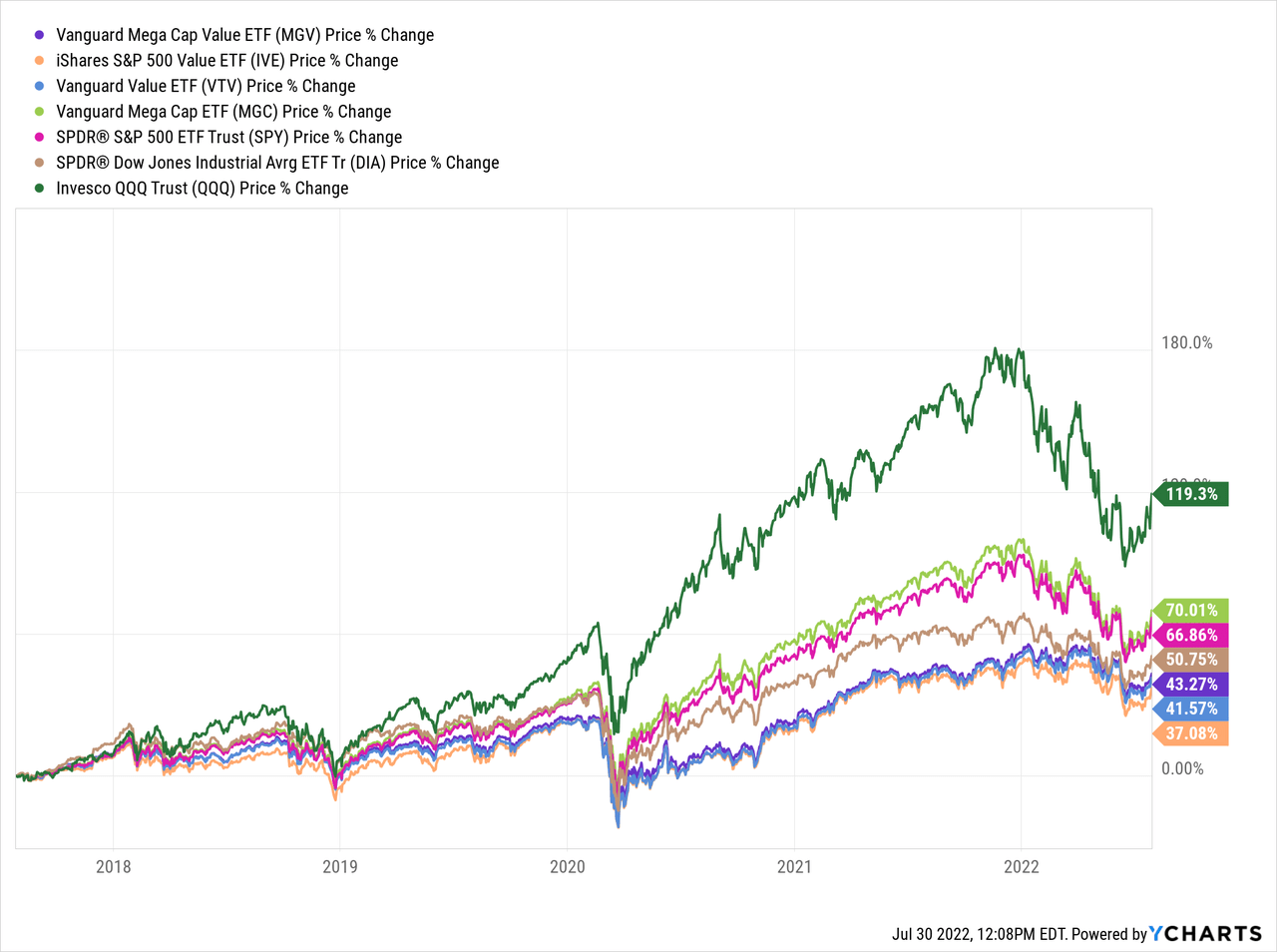
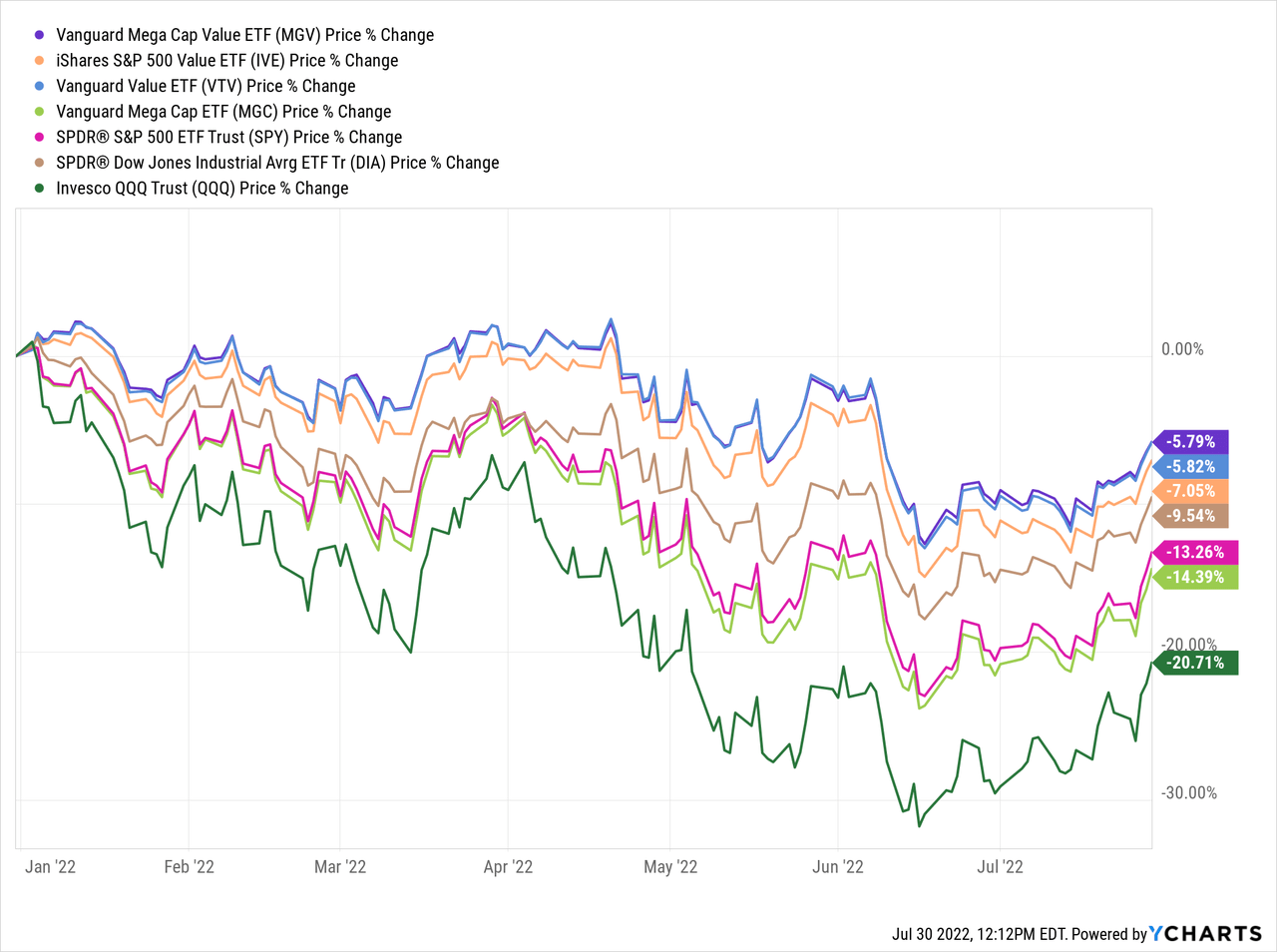
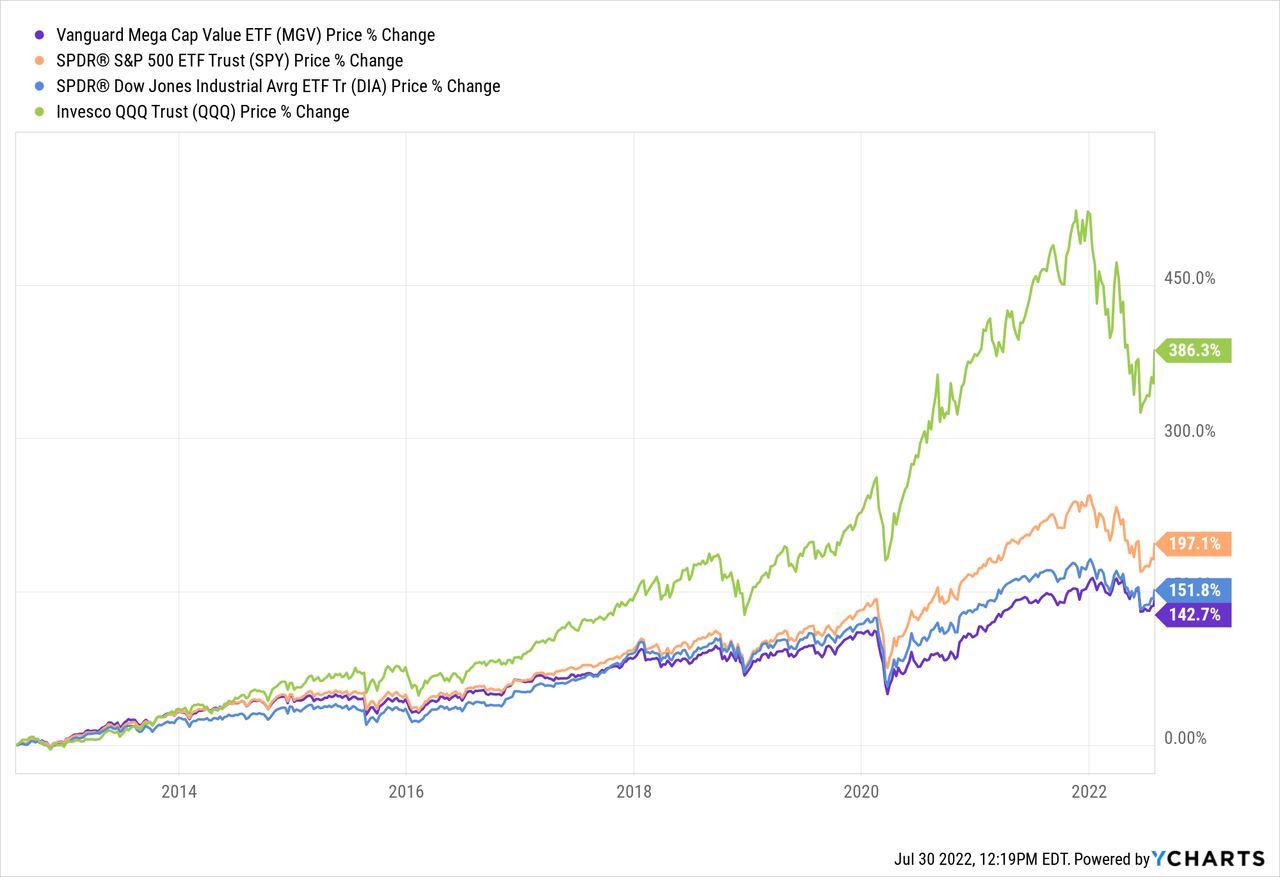
Be the first to comment